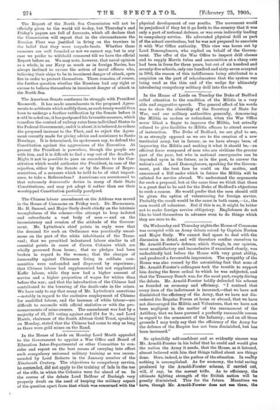The Chinese labour amendment on the Address was moved in
the House of Commons on Friday week. Dr. Macnamara, Mr. H. Samuel, and Major Seely dwelt chiefly on the intrinsic wrongfulness of the scheme—the attempt to keep isolated and subordinate a vast body of men — and on the inconsistency and evasion of the attitude of the Govern- ment. Mr. Lyttelton's chief points in reply were that the demand for such an Ordinance was practically unani- mous on the part of the white inhabitants of the Trans- vaal; that we permitted indentured labour similar in all essential points in cases of Crown Colonies which are wholly governed from home ; that no pledges had been broken in regard to the women ; that the charges of immorality against Chinamen living in celibate com- munities were unfounded and disproved by experience ; that Chinese labour had supplemented but not supplanted Kaffir labour, while they now had a higher amount of service and a higher proportion of wages for whites than before the war; and that the introduction of the Chinese had contributed to the lowering of the death-rate in the mines. We have only to say that many of Mr. Lyttelton's assertions —notably in regard to the exclusive employment of Chinese for unskilled labour, and the increase of white labour—are difficult to reconcile with official statistics or with the pro- nouncements of mine-owners. The amendment was lost by a majority of 61, 275 voting against and 214 for it; and Lord Harris, chairman of the South African Gold Trust, speaking on Monday, stated that the Chinese had come to stay as long as there were gold mines on the Rand.






































 Previous page
Previous page